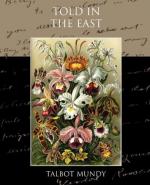IV.
An Indian city that has yet to have its mysterie’s laid bare and banished by electric light is a stage deliberately set for massacre. The bazaars run criss-crosswise; any way at all save parallel, and anyhow but straight. Between them lies always a maze of passages, and alleys, deep sided, narrow, overhung by trellised windows and loopholed walls and guarded stairways.
For every square inch where the sun can shine there are a hundred where a man could hide unseen. Through century piled on suspicious century, no designer, no architect, no builder has neglected to provide a means of secret ingress, and still more secret egress, to each new house. And the newest house is built on secret passages that hid conspirators against the kings of men who lived before the oldest house was thought of.
After the Mutiny of ’57 came broader roads—so that a cannon might be trained along them.
But in ’57, Jailpore was a nest of winding alley-ways and blind bat and rat holes, where weird smells and strange unlisted poisons and prophecies were born. In its midst, tight-packed in a roaring babel-din of many-colored markets, stood a stone-walled palace, built once by a Hindu king to commemorate a victory over Moslems, added to by a Moslem Nizam, to celebrate his conquest of the Hindus and added to once again by the Honorable East India Company, to make a suitable barracks for its native troops.
From the rat-infested slums, from the hot shadows and the mazy back-bazaars, from temples, store-houses, shops, and from the sin-steeped underworld, there screamed and surged and swept the many-graded, many-minded polyglot rebellion-spume. A quarter of a million underdogs had turned against their masters. A hundred factions and as many more religions, all had one common end in view— to loot. All were agreed on one thing—that the first stage of the game must be to turn Jailpore and, after Jailpore, India, into a charnel-house.
Around and around the burning palace the mob screamed and swept uncontrolled. Moslem looted Hindu, and Hindu Moslem. Armed sepoys, with the blood of their British officers fresh-soaked on their British uniforms, and the unspent pay of “John Company” still jingling in their pockets, danced weird, wild devil-dances through the streets, clearing their way, when they saw fit, with cold steel or wanton volleys. Women screamed. Caste looted caste. Loose horses galloped madly through the streets. Here and there a pitched battle raged, where a merchant who had wealth had also courage, and apprentices and friends to help him defend his store.
And through all the din and clamor, under and above the howling and the volleys and the roar of flames, sounded the steady thumping of the sacred war-drums. The whole sky glowed red. The Indian night was scorched and smoked and lit by arson. Hell screamed with the cooking of red mutiny, and throbbed with the thunder of the sacred temple-drums. And that was only one of the hells, and a small one. India glowed red that night from end to end!




